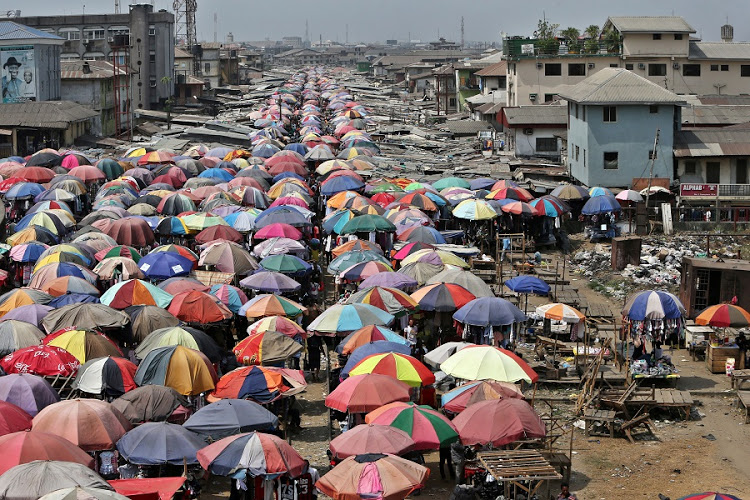French navy seizes nearly 10 tonnes of cocaine off West African coast
Nigeria is set to overtake SA as biggest African market by 2022

Bloomberg (File photo) / Open for business: Traders sell their goods beneath large parasols at the Mile One market in Port Harcourt, Nigeria.
With ongoing political and policy uncertainty, Nigeria is set to overtake SA as the biggest market in Africa by 2022. According to the 2017 African Business Outlook Survey, the top three markets were the sub-Saharan countries with the three largest economies, SA, Nigeria and Kenya, with 91% of respondents having business based there. While these markets were expected to remain the top three over the next six years, respondents expected Nigeria to emerge as their single most important market by 2022.
The survey compiled by The Economist Corporate Network (ECN) is based on responses from 150 CEOs who have Africa-based commercial operations. The report looks at current sentiment in the region and future prospects.
ECN Africa director Herman Warren, who authored the report, said: “Nigeria led in 2015 but the recession in 2016 knocked it. Nigeria is expected to make a big come-back and grow faster than SA.”
The survey shows African governments are trying to attract more investment and be less reliant on low value-added commodity exports by diversifying their economies. The slowdown in commodity prices affected the region’s rate of economic growth: 2016 was the first year in more than a decade that Africa’s economic growth (1.4%) did not exceed the rate of global GDP growth (2.2%).
In spite of slower economic growth, compared with the rest of the world, 63% of respondents indicated that their firms achieved similar or higher margins from Africa-based operations in 2016, with East Africa-based operations singled out as the most profitable.
Things are looking up in 2017 with respondents expecting their firms’ profit margins to improve across the board. Warren said some of the biggest trends to emerge were challenges businesses faced. Despite the prospects for growth, operating in the region still poses major obstacles. Respondents cited regulatory issues, macro-economics, currencies and a skills deficit as the biggest concerns.
“Talent featured as a major challenge. The feeling is that we need to create a talent pool by developing curriculums to create a skill set,” the report notes.
The report also outlines specific challenges for business in SA. While SA is expected to grow slightly faster in 2017, Warren says the overall pace of expansion remains below potential. “Concerns around SA were raised. Political uncertainty, labour rigidity and ambiguous policy played a huge factor and have contributed to the dampened economic outlook.”
In the report, Warren says: “SA is likely to remain a key market for their firms for at least the next five years. This may reflect SA’s importance for many companies as a springboard into the rest of the region.”












Leave a Reply
Be the First to Comment!
You must be logged in to post a comment.
You must be logged in to post a comment.